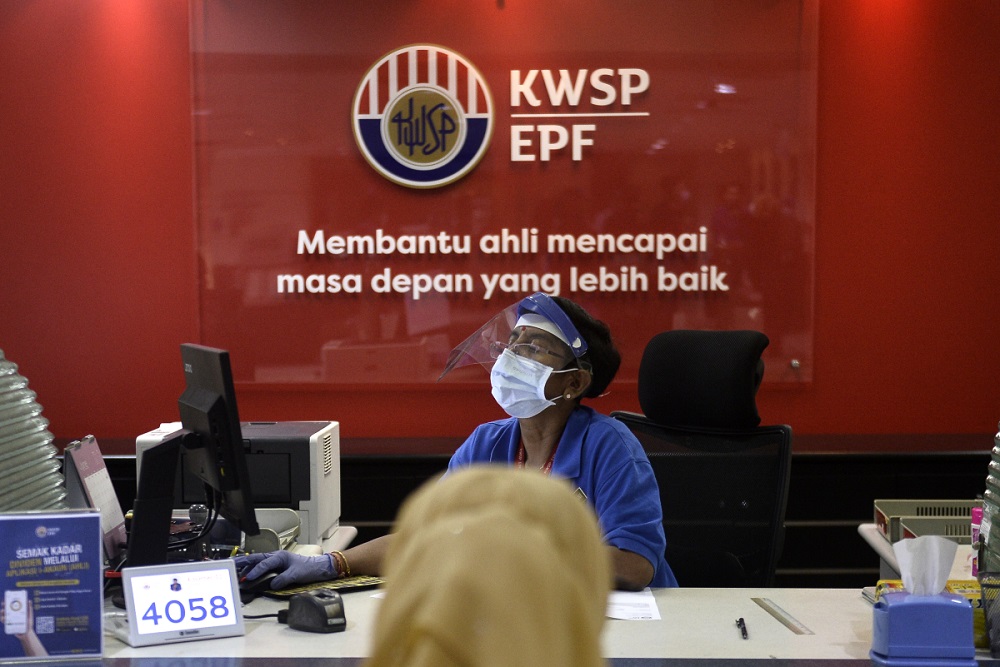KUALA LUMPUR, Nov 13 — Putrajaya could face massive hurdles in its bid to fix a potential retirement crisis by allowing private contributors to withdraw from their core Employees Provident Fund (EPF) savings, financial analysts and trade unions have warned.
As many as 2.2 million contributors have depleted their Account 2 funds while up 32 per cent have less than RM5,000 in their Account 1, the private pension fund manager said recently as it called for urgent solutions to avert a financial storm.
Under Budget 2021, the Perikatan Nasional administration will let retrenched workers withdraw a maximum of RM500 monthly from their Account 1 for a total of 12 months starting January next year, among a slew of measures unveiled to aid employees hit by the Covid-19 pandemic.
Malaysian Trade Unions Congress president Datuk Halim Saad said the policy endangers both contributors and the private pension fund system, now forced to front money to millions who have little to draw from.
“With the situation today, it’s going to be difficult for EPF to get most from its investments and good dividends,” he said in a phone interview with the Malay Mail.
“So with their savings already depleted, what would happen to their retirement? Bear in mind that many don’t even have enough money in their Account 1 that the EPF may have to front the money first,” he added.

Close to half of EPF contributors under 55 (5.38 million) have savings of less than RM10,000, according to a November 11 news report that cited the fund’s chief executive officer Datuk Tunku Alizakri Alias, who again called for urgent solutions to the country’s retirement quagmire.
Also, Finance Minister Datuk Seri Tengku Zafrul Aziz revealed this week that a third of contributors have less than RM5,000 in the same account, while another 10 per cent have savings of between RM5,000 and RM10,000.
In an interview with TV3 on Monday, the minister said the problem was structural and required long-term solutions. But he defended the decision to allow contributors to withdraw their EPF savings as necessary, claiming it was a popular move that is well-received by stakeholders.
This may be so among older contributors — age 54 and above — who may feel less of the policy’s negative impact because they have more savings than younger contributors, MTUC’s Halim said.
But with over half of these contributors having under RM50,000 set aside for retirement, the union said the measure could still prove harmful in the long run.
“It is better for the government to assist rather than doing something that would put their retirements under jeopardy,” Halim said even as he noted the ability for older contributors to cope with a reduced savings in the short term.
“I think they cannot look for an easy way out of their responsibilities... they should emulate countries like Singapore and Germany,” the MTUC president added, as he called for increased assistance for private workers, including for paid-for upskilling and rehiring programmes.
Financial planners believe the policy, though necessary, may also have harmful long-term consequences even for better-off contributors, a large number of whom are still found to have poor financial literacy.
Some have called for conditional withdrawal, such as compulsory financial planning counselling, or reduce the limit of withdrawal to just six months instead of a year.
“For a large number of private sector workers EPF savings is their only pension money,” noted Dennis Chin, financial planner with Harveston Financial Group, a private wealth and financial management outfit.

“We shouldn’t encourage them to tap into their retirement savings because they could misuse the policy given financial literacy among the B40 and M40 is still very low,” he added, referring to the bottom and middle 40 per cent income earners.
“There are many professionals I know of who do not know basic financial management knowledge, like not knowing that fixed deposits can generate income than savings accounts.”
Almost 70 per cent of Malaysians are in need of financial literacy support, according to a recent survey by newly-launched financial literacy platform Multiply.
Mercer, a US human resources consultancy, said the EPF could see a shortfall of about US$9.4 billion (RM39.5 billion) when the Account 1 withdrawal policy takes effect January next year.
The government has also allowed companies to reduce their share of contribution from 11 to nine per cent.




















